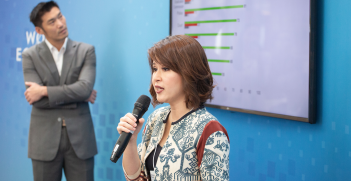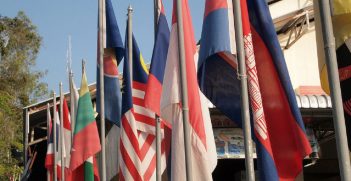Singapore’s Prime Minister in Waiting

The likely election of Heng Swee Keat as Singapore’s fourth prime minister will cement consultative authoritarianism as a PAP-favoured mode of governance.
Speculation about Singapore’s fourth prime minister has been rife since incumbent Lee Hsien Loong confirmed following the 2015 election that he intended to step down in 2022. Options narrowed considerably on 23 November when the ruling People’s Action Party (PAP) announced that 57-year-old Minister for Finance Heng Swee Keat would become PAP’s assistant first secretary-general. In Singapore’s orderly leadership succession process, the same post was assumed by Goh Chok Tong before replacing Lee Kuan Yew in 1990 and, in turn, by Lee Hsien Loong prior to succeeding Goh in 2004.
Heng was the consensus—though not unanimous—choice by his fourth-generation (4G) PAP colleagues, after a protracted internal process. The other main contender, Chan Chun Sing, was appointed second assistant secretary-general. This could signal a growing PAP maturity in accommodating intra-party competition, but also a need for Heng to consolidate his support.
The choice between Heng and Chan is as much a structural one over centres of state power as it is about the capacity and style of each candidate. In recent decades, former military officers have been recruited into key posts within government, state bureaucracies and government-linked-companies. Chan, like Prime Minister Lee and various other current ministers, is a former soldier-scholar.
Heng offers a departure from this pattern. During 15 years in the police force he rose to the role of assistant commissioner. From 1995, he excelled in the state administrative service, including as permanent secretary at the Ministry of Trade and Industry and managing director of the Monetary Authority of Singapore (MAS), the city-state’s de facto central bank. Elected to parliament in 2011, Heng was promptly appointed education minister, then minister for finance after the 2015 election.
Given Heng’s background in the finance sector, he is well placed to represent the interests of financial capital so important to Singapore’s economic globalisation, including Singapore’s sizeable sovereign wealth funds. As Finance Minister, he chairs a 33-member Future Economy Council tasked with advising on sectoral transformations in Singapore. This is one opportunity for Heng to extend and consolidate his coalitions within the state and business community in order to buttress support for his leadership aspirations.
Importantly, 4G colleagues look to Heng to project a decisive breakthrough in countering lingering public perceptions of the PAP’s politics as overly paternalistic and top-down. Heng is especially qualified to shore up PAP institutions of consultative authoritarianism meant to achieve this.
Consultative authoritarianism
Pioneered by Goh through nominated members of parliament and various mechanisms for policy feedback, consultative authoritarianism has increased opportunities for political participation. Yet these state-sponsored initiatives are essentially intended as alternatives—rather than supplements—to political competition. Those who submit feedback may be projected as representatives of the broader population, but they lack a mandate from other citizens to represent them. Authorities can also ignore, exploit or act upon feedback as they see fit.
As explained in my book Participation without Democracy, consultative strategies to contain political conflict accompanying capitalist transformations do not always go to plan. They lost credibility in Malaysia nearly two decades ago after the government failed to act on public suggestions arising from two National Economic Consultative Councils. Disenchanted citizens consequently looked more to independent civil society and party-political activism, culminating last May in the first change of government since independence in 1957.
Heng has already led innovations in consultative institutions. Concerns regarding rising social and material inequalities were pivotal to a 7 percent voter backlash against the government in 2011.
Consequently, starting in August 2012, Heng chaired a year-long series of consultations called Our Singapore Conversation (OSC). The 26-member OSC committee drew members from business, media, academia, the legal profession and community groups, but excluded political opponents.
The OSC was different in scale and modus operandi from earlier, more-focused government-led enquiries. In investigations into perceived public policy challenges, a reported 47,000 Singaporeans were engaged through a wide assortment of meetings led by government and or community organisations in diverse settings, including small groups in coffee shops. Additional feedback was obtained through email, Facebook and You Tube videos.
Crucially, the OSC report signed off by Heng contained no concrete policy recommendations. Instead, it documented concerns and views among Singaporeans, identifying various vague “core aspirations”. Implicitly, these aspirations embodied a consensus, leaving the government to decide how to give them effect.
Approaching, during and after the 2015 election, PAP leaders portrayed OSC feedback as instrumental in its policy adjustments. This included increased social spending to address inequalities long-championed by opposition parties. The 9.8 percent swing to the PAP at the 2015 polls gave apparent weight to PAP claims that bypassing political competition through state-sponsored participatory institutions was the most effective way for Singaporeans to participate politically. Heng declared after the election that the ruling party needed to “engage even more extensively and even more deeply.”
However, Heng will confront challenges and possible contractions in developing this agenda. The OSC’s political success must be viewed in conjunction with major PAP boosts to public health and social spending. Without a sustained expansion of social redistribution accompanying future consultation initiatives, the PAP will struggle to repeat anything like its 2015 vote share.
Yet Heng and other 4G PAP leaders—like those before them—share a deep ideological embrace of meritocracy and aversion to what they label “welfarism”. This makes it difficult to commit to the scale of redistribution necessary to render oppositional politics irrelevant. In Heng’s recent budget he anticipated a GST increase from 7.00 percent to 9.00 percent sometime between 2021 and 2025 to sustain social spending. This could erode some of the positive effects of recent government transfers to lower income groups. For an example of the effect of bypassing political competition in favour of working with government, look no further than the National Trades Union Congress, affiliated with PAP. This political co-option at the expense of a genuinely independent labour movement has not prevented—but has arguably contributed to – the fact that working-class voters consistently provide the largest base of opposition support.
Garry Rodan is Professor of Politics & International Studies and Director of the Asia Research Centre, Murdoch University. He is a member of the AIIA’s Research Committee.
This article is published under a Creative Commons Licence and may be republished with attribution.





